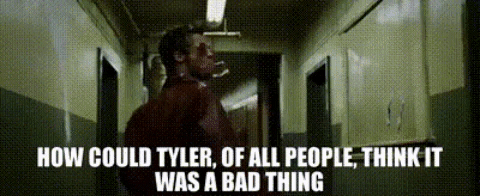SISKO:
Let's think about it.
A Starfleet security officer is fascinated by a nineteenth century French melodrama, and now he's a leader of the Maquis, a resistance group fighting the noble battle against the evil Cardassians.
DAX:
It sounds like he's living out his own fantasy.
SISKO:
Exactly. And you know what?
Les Miserables isn't about The Policeman.
It's about Valjean, the victim of a monstrous injustice who spends his entire life helping people, making noble sacrifices for others.
That's how Eddington sees himself.
He's Valjean, he's Robin Hood, he's a romantic, dashing figure, fighting the good fight against insurmountable odds.
DAX:
The secret life of Michael Eddington.
How does it help us?
SISKO:
Eddington is The Hero of His Own Story.
That makes me The Villain.
And what is it that every hero wants to do?
DAX:
Kill The Bad Guy.
SISKO:
That's part of it.
Heroes only kill when they have to.
Eddington could have killed me back in the refugee camp or when he disabled the Defiant,
but in the best melodramas The Villain creates a situation where The Hero is forced to sacrifice himself for The People, for The Cause.
One final grand gesture.
DAX:
What are you getting at, Benjamin?
SISKO:
I think it's time for me to become The Villain.
“The answer to all of this, everything that we’re talking about, is education into early history.
Until people understand the Stone Age, the nomadic period, the agrarian era, and how culture, how civilization built up. . .
In Mesopotamia - the great irrigation projects. Or in Egypt where you had. . . Centralized government authority became necessary to master these. . .
You had a situation, an environmentally difficult situation like the deserts Mesopotamia, or the peculiar character of Egyptian geography where you can only have a little tiny fertile line along the edges of the Nile.
Otherwise, desert landscape.
So [understanding] civilization and authority as not necessarily about power grabbing but about organization to achieve something for the good of the people as a whole.
Peterson:
That’s exactly the great symbolism of
The Great Father.
Paglia: By reducing all hierarchy to power, and selfish power, is utterly naive. It’s ignorant.
I say education has to be totally reconstituted, including public education, to begin in the most distant past so our young people today, who know nothing about how the world was created that they inhabit, can understand what a marvelous technological paradise they live in.
And it’s the product of capitalism, it’s the product of individual innovation.
Most of it’s the product of a Western tradition that everyone wants to trash now. If you begin in the past and show. . . And also talk about War, because War is the one thing that wakes people up, as we see.
Peterson: And as we may see.
Paglia: Yes, War is The Reality Principle.
My father and five of my uncles went to World War II.
My father was part of the force that landed in Japan.
He was a paratrooper at the time of the Japanese surrender. And a couple of uncles got shot up and so on.
When you have the reality of war, when people see the reality, the horrors of war - Berlin burned to a crisp and so on.
Starvation and all. . . Then you understand this marvelous mechanism that brings water to the kitchen.
And you flip on a light and the electricity turns on.
Peterson: I know, for me, and I suppose it’s because I have somewhat of a depressive temperament. . .
I mean one thing that staggers me on a consistent basis is the fact that anything •ever• works.
Because it’s so unlikely, you know, to be in a situation where our electronic communications work, where our electric grid works. And it works all the time, it works one hundred percent of the time.
And the reason for that is there are mostly men out there who are breaking themselves into pieces, repairing this thing which just falls apart all the time.
Paglia: Absolutely. I said this in the Munk Debate in Toronto several years ago. All these elitists and professors sneering at men. It’s men who are maintaining everything around us.
This invisible army which feminists don’t notice.
Nothing would work if it weren’t for the men.
Peterson: A professor is someone who’s standing on a hill surrounded by a wall, which is surrounded by another wall, which is surrounded by another wall - it’s walls all the way down - who stands up there and says I’m brave and independent. It’s like, you’ve got this protected area that’s so unlikely - it’s so absolutely unlikely - and the fact that people aren’t on their knees in gratitude all the time for the fact that we have central heating and air conditioning and pure water and reliable food. . . It’s absolutely unbelievable.
Paglia: Yes, I mean people used to die. . . The water supply was contaminated with cholera for heaven’s sake. People don’t understand. To have clean water, fresh milk, fresh orange juice. All of these things. These are marvels.
Peterson: And all of the time.
Paglia: All of the time. Western culture is heading - because we are so dependent on this invisible infrastructure - we’re heading for an absolute catastrophe when jihadists figure out how to paralyze the power grid. The entire culture will be chaotic. You’ll have mobs in the street within three days when suddenly the food supply is interrupted and there’s no way to communicate.
That is the way Western culture is going to collapse. And it won’t take much.
Peterson: Single points of failure.
Paglia: Because we are so interconnected, and now we’re so dependent on communications and computers. . . I used to predict for years it’ll be an asteroid hitting the earth, and then we’ll have another ice age.
